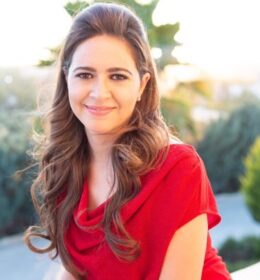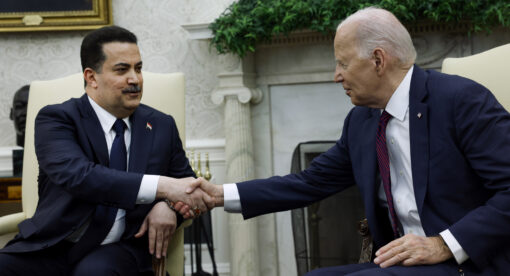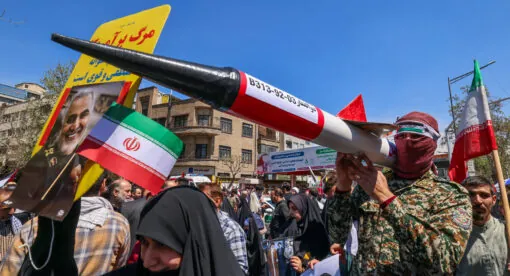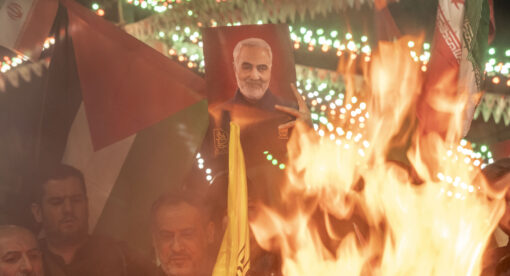This Newlines Institute Contours podcast assesses state resilience and fragility in Jordan and the future of the U.S.-Jordanian relationship. Newlines Institute Senior Analyst and Contours host Nicholas Heras sits down with Suha Ma’ayeh, Rana Sweis, and Dr. Curtis R. Ryan to discuss why King Abdullah II’s upcoming visit to the White House to meet President Joe Biden is such a high-stakes meeting for the future of Middle East stability and security. Suha Ma’ayeh is a Jordanian freelance journalist and researcher based in Amman. She has written extensively on domestic politics, Arab spring protests, foreign affairs, terrorism, elections, and corruption, including the crisis in southern Syria and the influx of refugees, for the Wall Street Journal, Foreign Policy, and Foreign Affairs. Rana Sweis is a Jordanian journalist and researcher covering political, social and refugee issues in the Middle East, most often for The New York Times, and the founder and managing director of Wishbox Media. She is the author of “Voice of Jordan,” a book that tells the story of Jordan through the lives of ordinary people, including an Iraqi political cartoonist, a Syrian refugee, a female parliamentarian and others. Dr. Curtis R. Ryan is a Professor of Political Science at Appalachian State University in North Carolina. He has written extensively on Jordan’s domestic and international politics and is the author of three books on Jordan, most recently, “Jordan and the Arab Uprisings: Regime Survival and Politics Beyond the State.”
Nick Heras: Hello, everyone, and thank you for joining us for today’s Contours podcast, a production of the Newlines Institute for Strategy and Policy. My name is Nick Heras, and I’m a senior analyst and head of the State Resilience and Fragility program here at the Newlines Institute. Today, we will have a special discussion on state resilience and fragility in Jordan and the future of the U.S.-Jordanian relationship with three leading experts on Jordan: Suha Ma’ayeh, Rana Sweis, and Dr. Curtis R. Ryan. We will discuss the significance of King Abdullah II’s visit to the United States in the context of the Hashemite monarchy’s ongoing and at times contested efforts to alleviate internal, socio-economic challenges in Jordan, to manage political reform and expand opportunities for civil society participation inside the Hashemite kingdom, and what to look for over the horizon in the U.S.-Jordanian relationship.
Suha Ma’ayeh is a freelance journalist and researcher based in Amman, Jordan. She has written extensively on domestic politics, Arab Spring protests, foreign affairs, terrorism, elections, and corruption, including the crisis in southern Syria and influx of refugees into Jordan. Her work has been published in The National, The Wall Street Journal, Foreign Policy, Foreign Affairs, and the Counter Terrorism Center at West Point, or CTC Sentinel. Rana Sweis is a Jordanian journalist and researcher covering political, social, and refugee issues in the Middle East, most often for The New York Times. She is also the founder and managing director of Wishbox Media, a provider of media and marketing services. She’s the author of “Voice of Jordan,” a book that tells the story of Jordan through the lives of ordinary people including an Iraqi political cartoonist, a Syrian refugee, a female parliamentarian, and others. And we’re also joined by Dr. Curtis R. Ryan, who is a professor of political science at Appalachian State University in North Carolina. He has written extensively on Jordan’s domestic and international politics and is the author of three books on Jordan, including “Jordan in Transition from Hussein to Abdullah,” “Inter-Arab Alliances: Regime, security, and Jordanian Foreign Policy,” and most recently the highly acclaimed “Jordan and the Arab Uprisings: Regime Survival and Politics Beyond the State.”
Suha, Rana, and Curtis, thank you for joining us for today’s important discussion on Jordan and the U.S.-Jordanian relationship, which is of great importance to both U.S. and Jordanian foreign and national security policy. To Suha, what is the significance of the king’s visit to the United States right now, and what are the stakes for Jordan-U.S. relationship?
Suha Ma’ayeh: King Abdullah is the first Arab leader to visit the White House since Biden became president in January this year. The meeting is significant for Jordan because ties between both countries were strained as a result of the Trump administration’s Middle East policies. These included proposing a peace plan which allowed Israel to annex large parts of Palestinian territory in a bid to settle the decades-old Palestinian-Israeli conflict. So, for Jordan accepting the deal would have compromised its security and stability as many Jordanians are of Palestinian origin who insist on the right to return to their homeland. Jordan is also a key U.S. ally, and it was sidelined in the past four years and ignored by Trump. The administration back then pursued policies that were unpopular and in part contributed to limiting Jordan’s foreign policy engagements in the region. These include forging closer ties with the Gulf states, which resulted in signing the Abraham Accords that normalized ties between them and Israel. And as a result, the undermined Jordan’s role as a key interlocutor in the Middle East.
But now with Biden as president, the mood is upbeat among Jordanian officials. So the meeting with Biden is expected to revitalize strategic security, political, and economic cooperation. It will also be an opportunity for Jordan to rejuvenate the two-state solution and ensure that the next aid package remains the same like before — at the same time, maybe finding leeway in easing the impact of the Caesar Act on the country’s economy, which has already been struggling, even before the COVID-19 pandemic. Amman, at the same time, has received positive signs from Washington regarding its support to the two-state solution, which Jordan advocates, including respect Jordan special role as the custodian of the holy sites in Jerusalem. The administration has also restored aid to the Palestinian refugees, and this was a relief for Jordan since the country hosts the largest Palestinian population in the diaspora, with 2.2 million registered with the U.N. Agency for Palestinian refugees.
On the personal level, both leaders have known each other since Biden was a senator and vice president. King Abdullah also enjoys good ties with Congress. Jordan is a key U.S. ally. Both countries cooperate on regional security matters and counterterrorism. Jordan is also a partner in the U.S.-led campaign against the Islamic State. Its security and stability are vital for the U.S., particularly in the wake of the chaos that has engulfed the region. Its throne has become even more strategically important after the defense cooperation agreement which entered into force on March this year. It allows U.S. forces to possess weapons on Jordanian territory while exercising their duties. The agreement was published in the Jordanian official gazette. But it also raised anger among Jordanians because it bypassed Parliament. There is talk also about the U.S. moving its military bases from Qatar to Jordan. This indicates that Jordan is considered to be a more secure base of operations in the region further away from Iranian pressure.
Dr. Curtis R. Ryan: I agree with everything that Suha just said. I think that laid it out in a really good way because I do think that there was a perception in Jordan for the last four years, the Trump years, that Jordan was basically marginalized or peripheralized in the region, in part by the U.S., the Trump administration, and in part by erstwhile allies, the Emirates, the Saudis, and certainly by the Netanyahu government in Israel. So, I think there’s a lot at stake really for Jordan getting its regional role back and retrieving its bilateral relationship with United States. But as Suha mentioned, though, part of the relationship continued anyway despite the rift, let’s say, between the Trump administration being frankly less interested in Jordan in almost every way — and yet at the security, military, defense cooperation level, even foreign aid, it just continued to plug along as though nothing had changed and even increased in some ways.
But even so, Jordanian leaders, not just King Abdullah but his father King Hussein, are used to very close personal relationships with American presidents and keeping that a warm alliance. And so, as Suha pointed out, Biden and the king have a close personal relationship. So I think they will look to re-establish that to the deal of getting Jordan and the U.S. back to where they once were, and then maybe even a little beyond that in terms of deeper cooperation.
NH: Thank you very much, Curtis. Rana, what is your perspective on this high-stakes meeting between the new U.S. president Joe Biden and King Abdullah II?
Rana Sweis: Thank you for having me, Nick. Of course, as Curtis and Suha have already mentioned, Jordan has been generally sidelined under the Trump administration. However, as Curtis mentioned, in other ways, nothing has changed Jordan is seen as a strategic, important ally for many reasons for the U.S. The visit reaffirms that Jordan is an important ally to the U.S. and remains so, it’s an important also player in the region and that it’s respected and that its opinion matters when it comes to the Palestinian-Israeli conflict as well, when it comes to Iraq, when it comes to Syria, when it comes to relations, in terms of security cooperation in the region. It’s more of a show that Jordan is important to the U.S.
And that’s basically what the visit affirms, that despite what happens internally in Jordan, whether it’s lack of reforms, or what we saw in April with the royal rift, that no matter what, that the U.S. is standing by Jordan. Of course, this has been amplified by the introduction of the U.S. troops from Afghanistan and Iraq, and Qatar, actually, coming now and setting base in Jordan as well. That’s a big tap, an indication that Jordan’s really important for the U.S.
NH: Thank you very much, each of you, for providing excellent insight into the significance of the King Abdullah II-president Biden meeting. Curtis, I’d like to turn to you. You have a very interesting way to describe Jordan in your book, “Jordan and the Arab Uprisings: Regime Survival and Politics Beyond the State.” You write, “Jordan shows how a state can be in continual movement without moving from the same spot.” So how does this reality shape the Jordanian state’s domestic and foreign policies?
CR: Part of the issue is that- the recurring issue is the domestic reform issue that keeps coming back. And that’s the part that feels like running on the spot, that there’s a lot of movement but not necessarily forward movement. But I think it might be helpful to think of it at a couple different levels. Internationally — since the question’s about both domestic and foreign policies of the Kingdom — internationally, there’s part of Jordan’s foreign relations that has been really quite consistent. Most of its relationships, again with a possible footnote asterisk for the four years of the Trump administration, the White House — but in general, it’s been more consistent in terms of close relationships with key Western allies, with the United States, with the United Kingdom, with key states in the European Union, even with key institutions like the NATO alliance and large global institutions like the IMF and the World Bank and so on that Jordan has a significant relationship with and really has no choice but to have a relationship with.
The less consistent part, I think, has been its regional relationships because there we see much more shifting alliance patterns over the last several decades and, as has already been mentioned, there’s some concern in Jordan about its relationships with the Gulf states, which Jordan would like to resolidify and have as less fickle relationships towards Jordan. But they have been wildly inconsistent, I would say more reactive to crises in Jordan, where foreign aid suddenly shoots upward because there’s a perceived crisis like 2011 or to a lesser extent the summer of 2018 of the protests during Ramadan. But it’s within the country, the domestic reform process, where I think people get that, deja vu all over again sensation.
And I think we’re there again. Following this royal rift, as Rana just mentioned, we have also a call for yet another domestic, more or less blue ribbon reform committee of more than 90 people led by a former prime minister. Samir Rifai will be the head of this new committee for reform, and he was actually the prime minister, perhaps ironically, 10 years ago during the Arab Spring that people were protesting to oust. But he’s in charge of this fairly broad-based committee that includes people from the far left and the far right and secular and religious and fairly eclectic, but it is tasked with coming up with a whole series of reforms. The deja vu part, though, refers not to that. Not that any of that is problematic. I think most people in Jordan would want some kind of reforms on a host of different issues. The deja vu part is the sense that people very often have of having been here before. We had committees like this in the late 1980s and early 1990s and got the national charter and certain level of pluralism and changes for election laws and parties and media, etc., and then did it again and had the national agenda, and then did it again in 2011 with massive committees of elites being pulled together to respond to the Arab Spring. And here we are 10 years later with a new committee.
So I think one of the questions will be what, if anything, is different this time around. They’re tasked with a really quick turnaround time of getting a whole series of specific reforms — an unusual set, by the way — of elections and parties and whether or not there need to be constitutional amendments, the usual suspects of reform issues, by October 1st. So, fairly quick turnaround, and I think for a lot of people question is, is it deja vu all over again, or is this something significantly new that might come to the table and actually represent change or more of the usual cycle?
NH: I want to pick up on this point of reform. Thank you for raising that, Curtis. You relate an interesting statement from one of your interviewees, an activist, in your book, “Jordan and the Arab Uprisings: Regime Survival and Politics Beyond the State.” The activist commented that Jordan is a tribal society, is a deep state society, and the deep state is deeper here than in Egypt. I want to pose this question, and I start with Rana. I know you have spent a lot of time working on this issue of the missed opportunities for reform in the Jordanian system in the past. Rana, what is your perspective on the missed opportunities for reform and Jordan, and if you were right in a strategy for the king on this issue, what would you advise him to do?
RS: Yeah, I’ll get to that Nick, and I just want to pick up on something that Curtis was mentioning. I think it’s important to mention something that is fundamentally, or let’s say the elephant in the room: King Abdullah I, he invested heavily in social welfare. There was an agreement when the state was founded that in exchange for the Loyalty of the citizens, he offered what we call East Bank tribes employment, educational opportunities, and health services for them and their families. This is the fundamental social contract that the state was built on and has been going on for the past 70-some years. We are seeing a total breakdown of this social contract, and that’s the elephant in the room.
And picking up on what Curtis was mentioning, I also pose a question: The committee that was formed to work on the latest reforms, was it imposed from outside after the royal rift and causing anxiety about the political situation? Or was it a decision from the top here, and if so why now, after as you mentioned, Nick, so many failures to reform in the past and missed opportunities? The biggest missed opportunity was in 2004 when there was something called the national agenda reform. The national agenda reform really set a new social contract for the country. It talked about political, social, economic, media, and women reform in Jordan. I’ve spoken to the author of this reform, and basically, it was topped by the security Authority or the security services in Jordan.
The first question today is, who is the one calling the shots in Jordan? Is it the royal court? Is it the security services? This is number one, there is this power struggle that is underneath that is sometimes talked about publicly, but often is not due to fear. The second question is, what will the new social contract look like, and can it be implemented? Because if it’s implemented then there is going to be a shift in power, even if it’s a slight shift in power, letting go of power is a big problem as well. And it is the reason, I believe, that there has been a stagnation in terms of reform.
There have been changes in terms of the electoral law 2016, and before that, I believe, 2012-13. Every election, we have the same conversation about the election law, we have the same conversation about economic reforms, but there is little tangible results that people can really feel on the ground. There is a lot of papers about political parties, but once people attempt to form political parties or even start thinking about political parties, there is a whole lot of consequences and push against them doing this, whether direct or indirect, whether it’s by the security services or in other indirect ways to pressure them, basically, to stop any political activities.
There is also the fear factor: Jordan was under martial law for many, many years under King Hussein until 1989. So you had decades of martial law that has created an environment of fear because political parties were banned. So to tell people, suddenly, I want political parties, I want a left, I want a center, I want a right-wing party, there needs to be an enabling environment for all that, and it simply does not exist at the moment.
Then we need to look at what are the priorities for Jordanians today. The priorities are economic reforms that really touch upon people’s lives. People want jobs: We have a 25% national average unemployment rate. We have a 50% percent youth unemployment — that’s five-zero. One out of every two young people in Jordan do not have a job. People all over Jordan are just talking about leaving the country, about brain drain. So all of these factors are really important to talk about because these are the missed opportunities. And also you have a very educated population, you have a population that is very news savvy, that is very smart, that want to have a voice but can’t seem to become part of the debate. A lot of people are skeptical about this new push for reform.
NH: Thank you very much Rana, that was a very interesting way to unpack this question. Curtis, what is your perspective on political parties in the Jordanian system and reform?
CR: I agree very strongly who with the way Rana just put that, including the missed opportunities aspect and that the general cynicism is really palpable in Jordan and has been for a really long time. It just keeps getting deeper because we get a new wave of flourish, of proposals, and so on, but then there’s perception on the ground that this didn’t really shake out yet again. The parties issue strikes me as particularly intriguing because as Rana pointed out, parties for decades were actually illegal, and it was only with the national charter in an earlier reform period, what some people still think of as the golden age of Jordanian reform, roughly 1989 and then only a few years in the ’90s before that one regressed and then we had other waves later.
But because of all that, parties have been identified as far left or pan-Arab nationalist or as Islamist and so on. And as a practical matter, most Jordanians are not in political parties, they do not want to be in political parties, they’re suspicious of political parties. And some data suggests that the younger you go, the more that actually seems to be an issue, which is not wildly promising. Because a lot of the new reform seems to be, and we’ll know for sure when they actually issue everything, but as far as I can tell, the new reform seems to be focusing very heavily on the political party issue. And as Rana pointed out, the king himself had talked about left, right, and center parties, left, right, and center parties, and having specific platforms, and so on.
So the new reform committees are pushing that, and they seem to be aware that there’s a significant cynicism in Jordanian society. But even so, this is a really uphill battle if most people are worried- have a negative perception of what parties are and what they actually do, or even if they didn’t that the mere act of doing exactly what they were just asked to do — form a political party, participate in public life — puts them on the radar of security services and other groups, puts their job on the line or gets them phone call they don’t actually want from the general intelligence directorate and so on. That’s so consistent, and so it has been such a part of your daily life for so long, it makes emphasizing parties — even if they are needed, even if that is a good idea — it makes it really hard to get that off the ground.
And to tack that back to the missed opportunities part, there really have been all these waves of reform, I think to the point that there been some great ideas on the ground over time, and it’s become also consistent for people to say things like, “That would be great if it really happens,” or, “What a good idea; I don’t think it’s really gonna happen.” Because we’ve seen a cycle. And here’s where the cynicism, I think, comes in especially. Some kind of crisis, possibly economically generated, as Rana and Suha both pointed out, that’s the underpinning issue throughout this, is for most people, it’s their livelihood and how difficult things are in terms of basic cost of living.
But even as these crises come and go, we get these cycles of possibly reshuffle the government. And if that’s not enough, then actually sack the government and replace it with a new one. And if that’s not enough, then we call for reforms. And then every once in a while, we could get one of these big blue-ribbon commissions. and it’s not that it’s nothing. It’s just that it’s probably not enough, and it seems so repetitive that the cynicism is getting worse, I would say.
And Rana pointed a really important issue out, which is something that didn’t used to be associated with Jordan. People leaving the country temporarily and the country relying on labor remittances, as well as foreign aid has been part of Jordan, at least since the early 1970s, but the idea of people talking about leaving forever is something that I’ve seen more and more really noticeably in the last 10 years, just thinking maybe we have a brain drain problem as well, of that level of dissatisfaction with political and economic life and what the possibilities are. So if there’s going to be a reform agenda that’s actually going to be successful and actually get implemented like some of the promising ones of the past like the national agenda, it has a real uphill battle just to convince people that it’s real this time.
NH: Thank you very much. And Curtis, that’s a very interesting way to frame the socioeconomic aspect of the challenges faced in Jordan. Suha, I want to ask you this question then: What are these socioeconomic challenges that are faced in Jordan? Where do they come from? And is there a way to alleviate them?
SM: The most important thing for Jordan, as Rana and Curtis just mentioned, is the economy. Jordan’s economy has already been struggling before the coronavirus pandemic hit Jordan in March last year, which worsened over the past year with soaring poverty and unemployment, which is very high, especially among the youth, as Rana mentioned. The lack of opportunities, the lack of social and economic opportunities, the injustices, poverty and joblessness, may lead to unrest if such grievances are unanswered. The economic growth was modest but unable to create jobs. The situation is even worse in the marginalized rural areas. These areas are where most of the members of the “Hirak” or the protest movement hail from. They’re from East Bank Jordanian origin. Jordan is home to hundreds of thousands of refugees registered with the UNHCR. So they are draining the country’s scant resources. Besides, Jordan is struggling with debt, which has ballooned and the IMF austerity measures increased taxes and lifted government subsidies on essential goods. It has pushed more Jordanians toward the poverty line.
On top of that, you have the opinion polls showing trust in the government is low. Complaints about incompetence, bad management, corruption, and repression are growing louder, even among the tribes, and the tribes are the traditional backbone of support for the Hashemite monarchy. At the same time, you have aid from the Gulf, it has dwindled, and the shrinking state finances means that it’s unable to further bloat the public sector.
How can these things be alleviated? This is a key question, and it’s difficult to answer. Well, first of all, it might help if we start with a genuine will to fight corruption, adopting genuine political reforms, which includes revisiting laws that siphon public freedoms and free speech, such as the cyber crime law, which restricts the freedom of online expression. Jordan should also be encouraged to take steps towards strengthening the rule of law and ensuring good governance, as well as accountability and transparency. This will help in the fight against corruption, and at the same time, it will restore citizens’ trust in the government.
However, I would also like to note that in order for reforms to happen, there has to be internal and external pressure. At this point, we have- the protest movement is weak, it’s fragmented. Parliament is malleable. There is no real pressure, not even from the West on Jordan to reform.
NH: Thank you, Suha. That is a very interesting way to dissect the socioeconomic challenges that face Jordan and how those challenges drive some of the dynamics that we’ve seen internally inside Jordan but also, as you point out, the international and transnational impact on Jordan. And so I want to pick up on that point, Rana. How does U.S. and international assistance to Jordan impact the internal situation inside the country?
RS: That’s actually a really interesting point, Nick, and a major issue in Jordan that needs to be dissected and discussed further. One of, I think, key events that took place in terms of the way that it is looked at and aid is distributed is after 9/11 — and I’m talking about Jordan, here — I think there was a shift in the U.S. from focusing the aid on development and democracy, more towards securitization and stabilization. We hear this often. I’ve even worked on research as well for some of these agencies, and really, they talk a lot about stabilization, stabilization. They no longer talk about aid; in return for aid, we have conditions for reform. I mean, we used to hear this a long time ago, but it is no longer a priority, as I mentioned.
I think the way that the U.S. and Europe view Jordan, they view it as a strategic, important, geopolitical, strategically located country that can help with intelligence, with the help of fighting terrorism, and today, the help of providing us with bases, whether it’s the Germans or the Americans or the British. It is someone we can talk to, someone that will listen to us. And civil society in Jordan doesn’t have, unfortunately, the impact that it should in a country because of the way that aid is targeted, the way that aid is distributed, the kinds of focus that they focus on, whether it’s deradicalization, without really looking at the core issues that need to be looked at: freedom of expression, human rights.
For example, we look at the past 10 years, how much we’ve heard about women, economic empowerment, and women empowerment in Jordan, yet unfortunately, we are in a very dismal place when it comes to women in Jordan. We’re talking about 86% that are absent from the labor force. We’re talking about legislation, unfortunately, that is now backsliding if not stagnating while countries like Saudi Arabia and Bahrain, they having 42%, has the highest female entrepreneurs in the world. Saudi Arabia has changed some of its guardianship laws, some of its employment laws to encourage women more in the workforce. And this is by no means me saying that the Gulf is fine or that women in the Gulf are fine, but I’m just saying where we are in Jordan in terms of where we should be as a country that is perceived to be modern, is perceived to be forward looking and very well developed.
In fact, it is due to the way that aid agencies, whether the EU or the U.S., have acted the past 20 years due to this shift that I mentioned, with the focus moving from democracy and development to securitization and stabilization.
NH: Thank you very much, Rana. And you raise a really interesting point here, about Jordan’s diminished regional standing. How does Jordan’s diminished regional standing constrain the Jordanian state’s options to manage the difficult environment?
CR: That’s an interesting question because I think Jordan has — a relatively small country in terms of its population, in terms of its economy, and so on — has prided itself on being able to leverage itself into a more influential country than you might otherwise expect. And I think that’s been going on throughout, really, the history of the kingdom, but certainly the King Hussein years through the current King Abdullah II years, everything from making itself indispensable, really, as a bastion state of anti-communist efforts in the Cold War through part of the global war on terror, and so on.
And as Rana noted, that also has positive and negative implications. It gets Jordan lots of attention, it probably leads to more foreign aid overall, but on the other hand, there is a crimping of Jordanian sovereignty and of more of our military bases and more foreign troops and so on, as Jordan becomes a forward staging area for other countries, counter-terror operations, and things like that. It has to be high on the agenda but also becomes almost a base, rather than a country, which is what a lot of the domestic criticism has been about. But I think especially in the last several years, Jordan’s attempt to recoup its losses have involved in some ways just waiting out the Trump administration and hoping there would be a change in Washington, which has now happened, and re-establishing the U.S.-Jordanian bilateral relationship, including even the personal ties aspect to the highest possible levels.
But even in the region, Jordan has tried to create an alternative network that is not, in terms of regional powers, it’s not led by Turkey, it’s not led by Iran, it’s not led by the Gulf States. And it is Jordan, Iraq, Egypt coming up with their own alternative alignment, which is not aimed against anyone in particular, so it’s not particularly a challenge, but it is an attempt to create a pan-arab Alliance of countries that have at least some interests and want to cooperate on energy. And all of them have an interest, actually, as different as they are and as different as their domestic circumstances have been everywhere from the Egyptian revolution and counter-revolution to Iraq’s post-invasion insurgency and rebuilding itself to Jordan’s very different set of domestic issues. But they’d all had lots of domestic issues, in short, and they’ve all seen a decline in their regional influence. So they all at least have an incentive, its banding together to re-establish themselves and put their mark on regional politics.
So I think that’s been part of what’s actually going on of Jordan, trying to get, in a sense, back into the game. And it usually tries to parlay that — its regional influence, its strategic importance — to more foreign aid, and it is an aid-dependent country. But as Rana pointed out, it also needs to do more than that so that it doesn’t just become an area where agencies talk about stabilization and countries talk about securitization, but Jordanians are talking about the cost of living, and of food, and of housing, and the problems of unemployment and a very different set of issues that they really need support with.
SM: I’d like to add a little bit on what Curtis said regarding Jordan’s diminishing regional role. Jordan has a significant geopolitical location, which has allowed it for years to assume the role of an interlocutor in the Israeli-Palestinian conflict. But we have seen this role diminishing, and the limits of Jordan’s clout in the conflict were underscored the during the Israeli attacks on Sheikh Jarrah in Jerusalem and the recent aggression on Gaza. And that’s because its ties with the former Israeli Prime Minister Netanyahu were strained and because Jordan continues to support the Palestinian Liberation Organization, which is fractured and it does not have any sway over Gaza.
Yet at the same time, Jordan stepped up its rhetoric and diplomacy in its attempts in the escalation and reclaim its regional standing. Jordan was even in contact with Hamas, according to Ayman Safadi, the foreign minister, even though ties between Jordan and Hamas were severed since Amman expelled its leaders to Qatar in ’99. But now, ahead of the visit, Jordan engaged in a flurry of diplomacy. The king went to Egypt and Iraq, and he’s trying to forge an alliance against Iran. Amman also re-engaged with the Syrian officials to attempt to lobby for Damascus to return to the Arab League after Bashar al-Assad was re-elected in May. King Abdullah, according to Israeli press, has also met with the Israeli prime minister secretly in Amman, the first meeting between them in more than five years. The visit also came after Ayman Safadi met with his Israeli counterpart at a border crossing and asked Israel to help ease Jordan’s chronic water shortage. So, these are important points to mention about how Jordan is trying to reclaim its regional role.
NH: Thank you, Suha. Rana would you like to add any thoughts on this question?
RS: I think in some ways today Jordan is, or let’s see, like King Abdullah is a bit in a honeymoon phase because Netanyahu’s out and he’s kind of restarted, as Suha mentioned, the talk with the new prime minister. Recently, you have Biden, who has really shown his support during the recent Israeli-Palestinian conflict as well as during the royal rift. Blinken also met with the foreign minister during that time, and he came to Jordan as well. And now he’s invited to the White House. Basically, it’s a good time now for King Abdullah after a very hard time, of course with being sidelined with the Abraham Accords as well, and the tensions between him and and MbS as well. It’s a good time after a very hard for years in the past.
NH: Thank you very much, Rana. Thank you, everyone. That’s a very interesting perspective on how Jordan’s diminished regional standing does, in fact restrain some of the Jordanian state’s options. So I want to close out our discussion with this question, and I know it’s a big question, but I’d like us to take it on. When the pomp and circumstance of King Abdullah II’s visit to the White House is over and we look over the horizon to the months and years ahead, what is each of you looking at most closely in regard to how the U.S.-Jordanian relationship develops during the Biden administration?
CR: I’m confident, I think, that the strategic part of the relationship is on solid ground and will probably be reaffirmed and, if anything, get deeper, and that includes the military, defense, security, intelligence cooperation and so on, which there’s some levels of that that are probably quite satisfactory.
But at a domestic level, I think there’s a danger always, there’s a danger of too much emphasis going in that direction and not on the things that most ordinary Jordanians in day-to-day life are really concerned about, and that includes what I was referring to before. The price of housing is utterly ridiculous, and even of rentals. Amman is one of the most expensive cities in the entire region. It’s comparable to a rich Gulf state, which makes no sense because Jordan is not a rich state. So it has such basic, fundamental, deep-seated economic issues that affect people socially on a daily basis, the cost of food, cost of housing, and the difficulty of just getting by and getting heating oil and all the basic necessities that people really need support with that, I hope, that the aid relationship for example, includes much more focus on that and, frankly, a lot less on the whole securitization stuff since we’ve had more than enough of that.
If anything, I think it’s actually tended to undermine issues of reform, which brings me really to that last part, which is the reform itself. I do think the U.S. would be a better friend to the Hashemite kingdom in a friendly but firm way of pushing for more meaningful reforms so this doesn’t turn into deja vu all over again, that this turns into a real opening of sorts. Because at the thing that really is striking to me is, beyond the types of reforms we keep talking about over and over again, that is over the last decades of parties and elections and whether or not government will be drawn from Parliament and so on. But it’s really been even more noticeable to me, especially in the last 10 years, that Jordan went from such an open society, especially in terms of its online freedoms, that it had the most wide-open internet of any country in the entire Arab world. And that was not true just three or four years after the Arab Spring started — in fact, way before that — but it became dramatically different. There’s so many restrictions now, and people getting into all kinds of trouble because of an online post, or a thing they thought they were in a private chat group about, or whether or not their various social media accounts are open or closed or being listened to.
And even things like civil society, which I was referring to earlier. One of the great achievements, supposedly, of the Arab Spring years for Jordan was allowing the creation of a teachers’ union in a country where there are an extraordinary number of people who are actually public school teachers, and almost every family has somebody in the extended family who’s actually a public school teacher. But that now has been dissolved, the leadership had been arrested, protests are continually countered rather than just allowed to actually take place. There seems to be an odd timing to actually go after the teachers’ union and squish one of the few real achievements of those years that was not just cyclical, but that seems to now be on the casualty list.
So I think I would say that the relationship between the two countries I think is on firm ground, is going to continue and re-establish itself after four really bizarre and almost neglectful years, but I do hope it includes some real and supportive emphasis on what most Jordanians are really looking for, which includes their individual freedoms and their ability, socially and economically, just to get by.
NH: Thank you very much, Curtis.
SM: I concur neck with Curtis. I think the relationship between the U.S. and Jordan is firm and strong and will continue to be so for the Strategic reasons that we mentioned. But that’s not where today the problem and the challenges lie. They lie within. You want to talk about stabilization, but what does that mean, really, if I’m telling you that 50 percent of youth in Jordan are unemployed? The unemployment rate is 25%. Ninety-two percent, 95% of Jordans believe corruption is rampant in Jordan, perceive at least that corruption is rampant and that the government is not serious about cracking down on corruption.
If there isn’t better governance, the U.S.-Jordan relationship will suffer as well because they need to realize that there are 10 million people, that you’re not only talking to the government. This works only so far and has worked in the past, but we really, I believe we’re at a crossroads. And if you want to be a real friend to Jordan, then you want to see it develop. You want to see good governance. You want to see people working, you want to see accountability, you want to see transparency, you want to see people thrive and not only survive.
RS: Well, the U.S. must send clear signals that it will strongly support economic and political reforms to help Jordan withstand the pressures it is facing. Jordan has weathered the crisis in the region, but the social and political tensions that gave rise to the Arab Spring protests persist. So it’s in the U.S. interest to ensure that the country remains a long-term and stable partner.
Thank you very much, Suha, Rana, and Curtis, for an excellent discussion on Jordan, its role in the Middle East, and its global standing. We will continue to look forward to a strong U.S.-Jordanian relationship in the months and years to come. Thank you all.
Although transcription is largely accurate, there could be some inaccuracies due to inaudible passages or transcription errors.









